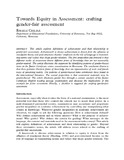| dc.contributor.author | Chilisa, B. | |
| dc.date.accessioned | 2011-06-08T13:19:12Z | |
| dc.date.available | 2011-06-08T13:19:12Z | |
| dc.date.issued | 2000-03-01 | |
| dc.identifier.citation | Chilisa, B. (2000) Towards equity in assessment: crafting gender-fair assessment, Assessment in Education: Principles, Policy & Practice, Vol. 7, No. 1, pp. 61-81 | en_US |
| dc.identifier.issn | 0969-594X | |
| dc.identifier.uri | http://hdl.handle.net/10311/834 | |
| dc.description.abstract | This article explores definitions of achievement and their relationship to gender-fair assessment. A framework to discuss achievement is drawn from the affinities of standpoint theory and post-structural theories' emphasis on the role of language in transmitting norms and values that shape gender relations. The first proposition put forward is that different modes of assessment denote different forms of knowledge that are not necessarily gender-neutral. The article illustrates the argument by identifying patterns of gender-biased items in the Junior Certificate science examinations in Botswana. The conclusion drawn is that these patterns illustrate forms of knowledge that are representative of male and female ways of perceiving reality. The patterns of gender-biased items corroborate those found in the international literature. The second proposition is that assessment materials may be gender-biased. The article illustrates gender bias through a content analysis of the Junior Certificate English reading passage examination and discusses the implications of this example for fairer assessment. Finally, a checklist is suggested for crafting gender-fair assessment. | en_US |
| dc.language.iso | en | en_US |
| dc.publisher | Routledge. http://www.informaworld.com | en_US |
| dc.subject | Assessment | en_US |
| dc.subject | Gender | en_US |
| dc.subject | Education—Botswana | en_US |
| dc.title | Towards equity in assessment: crafting gender-fair assessment | en_US |
| dc.type | Published Article | en_US |
| dc.link | http://pdfserve.informaworld.com/85277_751319030_713613318.pdf | en_US |

